‘Attacking the churches is just unforgiveable’ - #JusticeOrElse
By Askia Muhammad -Senior Editor- | Last updated: Jul 7, 2015 - 11:30:25 AMWhat's your opinion on this article?
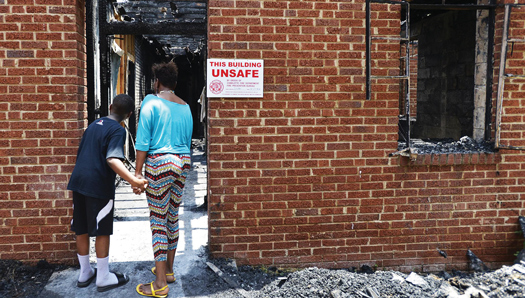
Elisha Walker, 9, and his mother Bonita Walker look at the charred remains of the back left wing of Briar Creek Road Baptist Church, June 24 in Charlotte, N.C. They are members of the church and Elisha had been attending summer camp since school ended for the summer. Investigators with the Charlotte Fire Department say a fire at the predominantly Black church is a case of arson.
|
WASHINGTON—Black churches, the symbol of sanctuary for tortured Black souls, especially in the Southern United States; once the headquarters of the Black liberation movement; are once again under attack in the South.
And as in decades past when similar rashes of mysterious fires torched them, White authorities—who are suspected in the minds of many to be in collusion with the race-hating arsonists—are dismissing the likelihood of a racist conspiracy.
Since June 17, the night a White supremacist and Confederate sympathizer calmly murdered nine parishioners in Charleston, South Carolina’s Mother Emmanuel AME Church during a Bible study meeting eight Black churches have gone up in flames.
Mount Zion AME Church in Greeleyville, S.C., 60 miles northwest of Charleston was the most recent. Authorities say they don’t believe that fire was intentionally set, although the same church was burned to the ground by the Ku Klux Klan 20 years ago.
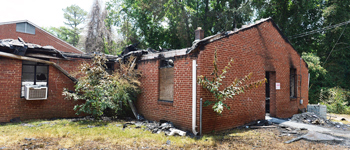
This June 24 photo shows the charred remains of Briar Creek Road Baptist Church exterior in Charlotte, N.C.
|
The cause of the fire which destroyed College Heights Baptist Church in Elyria, Ohio on June 25 has not yet been determined.
The Briar Creek Road Baptist Church in Charlotte, N.C. was completely destroyed by fire on June 24 in a case authorities believe to be deliberate arson. That same day, Fruitland Presbyterian Church in Gibson County, Tennessee was burned in an incident which is under investigation, but which is believed to have been started by lightning.
God’s Power Church of Christ in Macon, Georgia went up in flames on June 23. Authorities believe arson may be the cause of that fire.
College Hill Seventh Day Adventist Church in Knoxville, Tenn. caught on fire June 22. Authorities suspect arson.
In all authorities suspect three cases are clear cases of arson, the cause of five other church fires have not been determined.
“These burnings are reminiscent of what I went through as a child, and my grandparents and parents both talked about it at the table, not to me, but I could overhear them,” Charles Ogletree, director of the Charles Hamilton Houston Institute of Race & Policy, and professor of law at Harvard University told The Final Call. “And here it is again, the 21st Century.
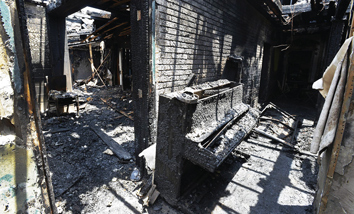
Charred remains of the back left wing of Briar Creek Road Baptist Church interior in Charlotte, N.C. Photos: AP/Wide World photos
|
The Rev. Dr. Major L. Jemison is immediate past president of the Progressive Baptist Convention. He told The Final Call he is also shocked at the rash of church burnings. “I am a byproduct of the Civil Rights movement, of course what we’re looking at from a racial standpoint is far worse than anything that my parents experienced, and I experienced as a child.
“You would think that some of these issues would have been eradicated long ago, but they have not. They’re being magnified and they’re on a marathon like we’ve never seen before. We understand the severity of what happened in Charleston, and the kind of signal it sends to the nation regarding race relations in America and how much work we need to do to bring healing and wholeness in that particular arena of life here in America.”
Member churches in the Progressive Baptist Convention are taking a pro-active approach, said Dr. Jemison. “The state where I live—here in Oklahoma—we are taking it very seriously. We are working with our security teams, making sure that our members are safe when they come to worship.
“We are making sure that not only White individuals who come to our churches, but also any other individuals who is not a member of our congregations, making sure that we engage them, not in an insulting way, but engage them in a conversation that we might be able to gain from a casual conversation,” Dr. Jemison continued.
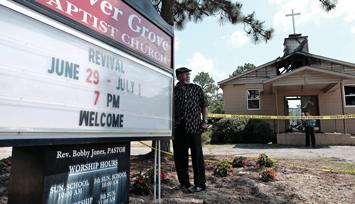
Glover Grove Baptist Church Pastor Bobby Jones stands outside the church in Warrenville, S.C. on June 26. The FBI joined other police agencies in investigating the fire that destroyed the predominantly Black church in Aiken County. No one was injured.
|
“What we’re doing here is patrolling, making sure there is a law enforcement presence around our churches, because a lot of churches are in remote areas. What we’re doing here is making sure that we engage security and law enforcement to make sure that they are patrolling those areas, and to let them know that we are watching and taking notice of what’s going on around our churches,” Dr. Jemison said.
Those practices are in line with what a seasoned law enforcement professional would advise. Ronald Hampton is president of the National Black Police Association. “We noticed that there was also this whole notion out there that the uprising of the Klan and other racial hate groups was involved in activities against Blacks and the Black churches.
“In the ’80s and in the ’90s, the law enforcement authorities didn’t really pay the kind of attention to it that the Black church leaders expected,” Mr. Hampton said.
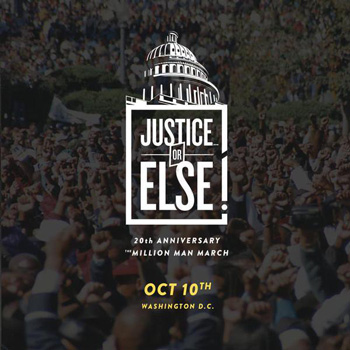
|
“So the churches are going to have to rely on developing some strategies that they can begin to protect themselves. If they can’t rely on the police department, if they can’t rely on the local government to assist them, then they’re going to have to develop some strategies to protect their church, to protect their property. And that means that the people who go to church there are going to have to be involved in the process of protecting it,” he said.
Mr. Hampton retired after a 25-year career with Washington’s Metropolitan Police Department. If he was hired as a security consultant by an at risk church: “I would tell them to, No. 1, go to some of the old reports, because we experienced church burnings in the ‘80s,” Mr. Hampton told The Final Call.
“The task force (that) was created included Black firefighters and police officers and they talked about security kind of things in terms of alarm systems—a lot of those churches that were burned in the ’80s were in rural areas.
“They talked about creating patrols, parishioners and members of the church-created patrols where they would take turns patrolling the area in their cars, of course, not by themselves but in their cars, looking and keeping up with the kind of things that were going on in their property. And then having some kind of a call-tree, a tree of people you would call when something like that goes down.
“And definitely having your church wired to an alarm system, and some sort of detection system. Also having to spend some money and having to implement sprinkler systems in churches so that they can work to try to put out the fire and reduce the damage to the church.”
For decades, visitors and members attending Nation of Islam meetings have undergone security checks for weapons and other substances—drugs, tobacco, alcohol—which are unfit for a place given to worship and prayer. In the current climate of attacks inside and against Black churches, others have come to recognize the wisdom of the N.O.I. security check procedure.
“The Honorable Elijah Muhammad set up a check procedure for us” more than 60 years ago, Aaron Muhammad, the Mid-Atlantic Regional F.O.I. student captain told The Final Call. “He knew what it would be like at a certain time” like this. In addition, for every man and woman in the Nation of Islam “we have our General Orders. All General Orders are always in effect, in particular to be especially watchful at night and during the time of meetings.”
For his part, Prof. Ogletree balances the legal arguments advanced by gun rights advocates, including those who have legalized so-called “open carry” statutes which permit licensed gun-owners to carry firearms into church services in some states. Still he agrees that guns have no place inside places of worship. “Whether you’re a pastor or a parishioner, or someone sitting in the church waiting to be saved, you want to be safe,” Prof. Ogletree said.
“I think that checking the guns at the door should happen to everybody. I hate that we even have to talk about this in 2015, but it is a reality,” he continued.
In addition to what congregations can do on their own, there is an important role which must be required from local as well as federal law enforcement authorities, to help prevent church burnings, and to solve the mysteries surrounding churches which have already been torched.
“I’ve had conversations with Eric Holder when he was attorney general and I’ve had conversations with my friend and colleague Loretta Lynch who replaced him as the attorney general,” Prof. Ogletree said, “and he was there late, but on the scene nonetheless (to) talk about what happened in Ferguson, what happened to Trayvon Martin, and what happened to these churches.
“And I think Loretta Lynch is going to have to do that. People in Congress are calling on her, and I think she has to say the church is one of the safest places—maybe a segregated place—one of the safest places that any person, a woman, man or child can go every Sunday or Saturday and worship to make sure that these places are sacred and protected.
“And I expect her to say that, not only say that, but enforce that if we have to seek enforcement from the Department of Justice,” he added.
The next president, Democrat, independent or Republican, should speak out strongly about protecting Black churches, Prof. Ogletree continued.
“It is an institution that has a history that dates well beyond our Civil Rights history and I think that’s important that we need to make sure that churches are protected and supported by every meaningful institution in America, to make sure we don’t have the destruction and the loss of life that we saw in Charleston, S.C. and other places as well.”
Prof. Ogletree said the 1995 Clinton administration investigation of church fires was important and connected to historian John Hope Franklin’s urging President Clinton to do something about the fires and call for a discussion of race. The effort failed but the attempt was important, he said.
“And that’s why I’ve been so keen about this, speaking about it openly and publicly, because attacking the churches is just unforgiveable. It’s time for us to stand up and not accept it—in a peaceful way—but stand up and not accept this burning of African American churches in particular. A necessity for us in the Civil Rights movement trying to respond to people who are either acknowledged members of the Ku Klux Klan, or some kind of racist organization that despises Black churches,” Prof. Ogletree said.
Despite laws which permit the open use of firearms, possessing or other armed responses on the part of Black individuals or congregations was discouraged by former police officer Hampton.
“I do know that in a lot of those areas, handguns and rifles are in the backdrop of those areas and members can own weapons and use them in the protection of their property,” he said. “If you’re out there patrolling alone and you have a weapon, you don’t know how many other people are out there that may be surrounding you, or out there doing the kind of dastardly things that ended up in the (Charleston) church.
“So we don’t want people to lose their life in that process. But surely we have cell phones. If you’re going to be out there riding around in a car, patrolling and looking out for your church, you can call the police, put them on notice. You can let them know that you’re out there and the hours you’re working, guarding your church, and then put them on notice that they should be paying attention to that also if you think your church is in danger of being set on fire.”
He added, “I don’t necessarily believe that all of these are the result of lightning strikes either. I just don’t think that’s the case. That’s easy enough for law enforcement to write that off, but the fact of the matter is there are hateful people out there that are doing these kinds of things.”
INSIDE STORIES AND REVIEWS
-
-
About Harriett ... and the Negro Hollywood Road Show
By Rabiah Muhammad, Guest Columnist » Full Story -
Skepticism greets Jay-Z, NFL talk of inspiring change
By Bryan 18X Crawford and Richard B. Muhammad The Final Call Newspaper @TheFinalCall » Full Story -
The painful problem of Black girls and suicide
By Charlene Muhammad -National Correspondent- » Full Story -
Exploitation of Innocence - Report: Perceptions, policies hurting Black girls
By Charlene Muhammad -National Correspondent- » Full Story -
Big Ballin: Big ideas fuel a father’s Big Baller Brand and brash business sense
By Bryan Crawford -Contributing Writer- » Full Story






 Click Here Stay Connected!
Click Here Stay Connected!








